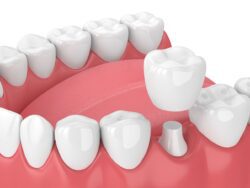If you have a tooth that has sustained significant structural damage, your dentist may recommend treating it with a dental crown. This ceramic cap gets placed over the tooth and seals into place with dental cement. The cap reshapes the tooth as well as protects it from further harm.
Though you may see how this durable dental fixture can help your smile, you can better understand its versatility when you learn about its specific uses in dentistry. Read on to find four of the many advantages that dental crowns can offer for a damaged tooth.

Dental Crown Benefits
Replace Weakened Tooth Enamel
Your teeth feature a hard outer layer called enamel that shields a sensitive interior. Though strong, enamel may erode over time due to poor oral habits or factors outside of your control like aging. Once gone, the enamel will not regenerate on its own.
However, your dentist can restore the structure of your smile by replacing thinned or weakened enamel with a dental crown. The crown covers the weak spots in the tooth so that harmful residues will not reach the inner layers and cause decay and other dental problems. You can also find relief from tooth sensitivity pain with protection from a crown.
Repair Tooth Breakage
The teeth endure wear and tear from chewing and biting all the time without issue. But accidents may occur where abnormal pressures may injure a tooth. A chip, crack, or fracture in the tooth could make your smile vulnerable to infections and other dental dangers.
Your dentist can amend this tooth breakage by placing a dental crown over the injury. It will make the tooth’s shape whole once again, improving its appearance. And the seal will make sure bacteria and plaque cannot penetrate to hurt your tooth any further. Seek prompt emergency dental attention for this injury before it worsens.
Brighten Tooth Color
Dental crowns are known for their restorative benefits, but the crown can also help you achieve your smile aesthetic goals too. Dentists design crowns on a custom basis for each patient. They factor in the natural size, shape, and color of the patient’s teeth for a gorgeous, authentic-looking finish.
This means that the crown can also be made according to the patient’s cosmetic goals. If they have severe discoloration in the tooth, a dental crown can cover the cosmetic damage and make the tooth appear brighter. A final polish will ensure a beautiful result for the patient.
Support Other Dental Treatments
Dental crowns serve as highly effective treatments on their own. But they can also provide ample support for other dental procedures. For instance, a crown will cover a tooth at the conclusion of root canal therapy. This way, the tooth remains safe from further dental damage after a dentist removes the tooth pulp.
A crown can also be a prosthetic tooth atop a single dental implant for patients seeking optimal tooth replacement solutions. The crown will also restore the health of a tooth that has suffered advanced tooth decay.
